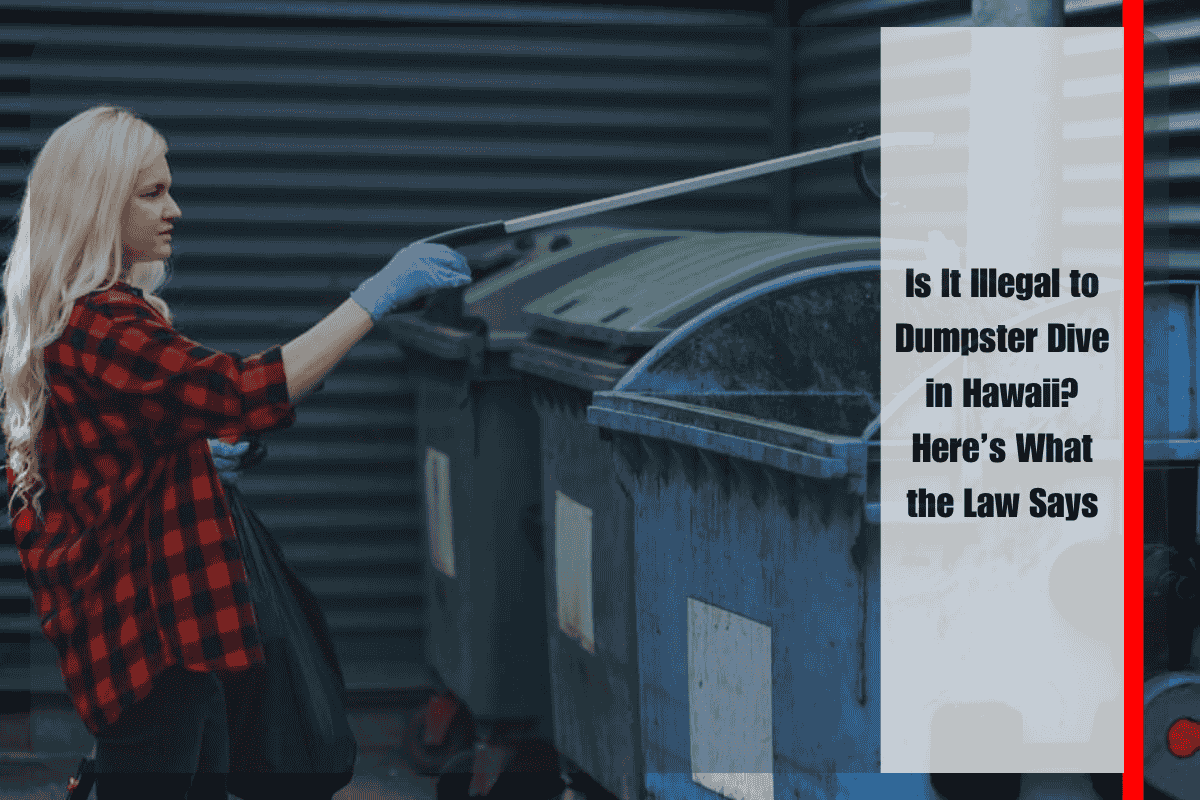Dumpster diving can seem like an effective way to find discarded treasures or save money, but it’s important to understand that not all forms of dumpster diving are legal. In Hawaii, as in many other places, there are laws surrounding what you can and cannot do when it comes to searching through dumpsters. If you’re considering dumpster diving in Hawaii, it’s essential to know the legal implications, as the rules vary based on location, type of property, and whether you’re trespassing or violating local ordinances. This article will explain the key legal aspects of dumpster diving in Hawaii and what you need to know before diving in.
What Does Dumpster Diving Mean?
Dumpster diving refers to the practice of going through commercial or residential trash bins (dumpsters) to find items that have been discarded. These items can range from food and clothing to electronics, furniture, or even valuable documents. While it might seem harmless or even resourceful, dumpster diving can lead to legal trouble if not done correctly or in accordance with local laws.
Hawaii’s Laws on Dumpster Diving
In Hawaii, there is no single state law that outright bans dumpster diving. However, several local ordinances and other laws make dumpster diving illegal in certain circumstances. Generally, the legality depends on where you are diving, the property involved, and whether you are violating other laws like trespassing or theft.
Trespassing and Property Rights
One of the most significant issues with dumpster diving in Hawaii is trespassing. Many dumpsters are located on private property, and you need permission from the property owner or manager to go through their trash. If you dive into a dumpster on private property without permission, you could be considered to be trespassing. In Hawaii, trespassing is defined as entering or remaining on someone’s property without authorization. If you are caught, you could face fines or even criminal charges.
In commercial or business areas, dumpsters are often placed in private lots or behind businesses, making them off-limits without the owner’s consent. Some businesses may allow people to take discarded items, but this should be explicitly stated or agreed upon to avoid violating property rights.
Local Ordinances and Restrictions
While dumpster diving may not be directly outlawed by state law in Hawaii, county or city ordinances may impose restrictions on it. Certain municipalities may have specific rules that make it illegal to dumpster dive in certain areas, especially in commercial districts or public spaces.
For example, in places like Honolulu, local ordinances govern the disposal and retrieval of waste. These laws are often focused on maintaining public order and cleanliness. In some areas, dumpster diving is seen as a public nuisance or health risk, particularly when it involves going through trash that may contain hazardous waste or food that could pose health concerns.
Additionally, some areas may enforce health codes and safety regulations that can make dumpster diving illegal. For instance, food safety laws prevent people from taking discarded food that may be unsafe to eat, and there are fines for handling food waste improperly.
Theft Concerns
Another concern when it comes to dumpster diving is the issue of theft. Sometimes, items in a dumpster might still belong to the property owner or business, and if you take something that hasn’t been officially discarded (like an item that’s been set aside for future use), you could be accused of theft. Even though the item is in a dumpster, it’s still technically considered property until the owner formally disposes of it.
In Hawaii, theft laws are taken seriously, and taking something without the owner’s consent could result in legal action. If you’re unsure whether the items you’re retrieving have already been abandoned or belong to someone else, it’s always better to ask the property owner first.
Environmental and Health Concerns
Dumpster diving in Hawaii could also raise environmental and health issues. Hawaii, with its unique ecosystem, has strict regulations aimed at protecting its environment, including waste management and cleanliness. Taking items from dumpsters that may have been exposed to hazardous waste, chemicals, or even rotting food could lead to health risks, including exposure to diseases or bacteria.
Local authorities often encourage people to properly dispose of trash to maintain a clean environment, especially in highly tourist-centric areas like Waikiki or other beach towns. Violating these local environmental rules could result in fines or other penalties, especially if the activity causes a mess or environmental damage.
What Can You Do to Legally Dumpster Dive in Hawaii?
If you want to dumpster dive in Hawaii without running into legal issues, there are a few precautions you can take:
Get Permission: Always seek permission from the property owner before diving into a dumpster, especially if it’s on private property.
Stick to Public Spaces: Public spaces, like parks, might allow some leeway for searching through public trash bins. However, always check local rules and regulations to ensure you’re not violating any laws.
Respect Health and Safety Guidelines: Avoid taking food or items that could pose a health risk, and make sure you don’t create a mess while diving.
Stay Informed on Local Ordinances: Every county or city in Hawaii may have different regulations regarding dumpster diving. It’s a good idea to research local ordinances or contact local authorities for clarity.
Dumpster diving in Hawaii is not outright illegal, but it can be risky if you’re not following the rules. Many of the legal issues surrounding dumpster diving are related to trespassing, theft, and local health and safety regulations. It’s important to always get permission from property owners, avoid diving into dumpsters on private property without consent, and be aware of any local ordinances that may restrict the practice. By following these guidelines, you can minimize the risk of legal trouble while practicing dumpster diving in Hawaii.
Sources
[1] https://scrapsafari.com/dumpster-diving-in-hawaii/
[2] https://www.rolloffdumpsterdirect.com/dumpster-diving-illegal/
[3] https://worldpopulationreview.com/state-rankings/dumpster-diving-legal-states
[4] https://www.reddit.com/r/DumpsterDiving/comments/1q36ze/is_dumpster_diving_legal_in_your_area_heres_how/
[5] https://www.legalmatch.com/law-library/article/is-dumpster-diving-illegal.html












